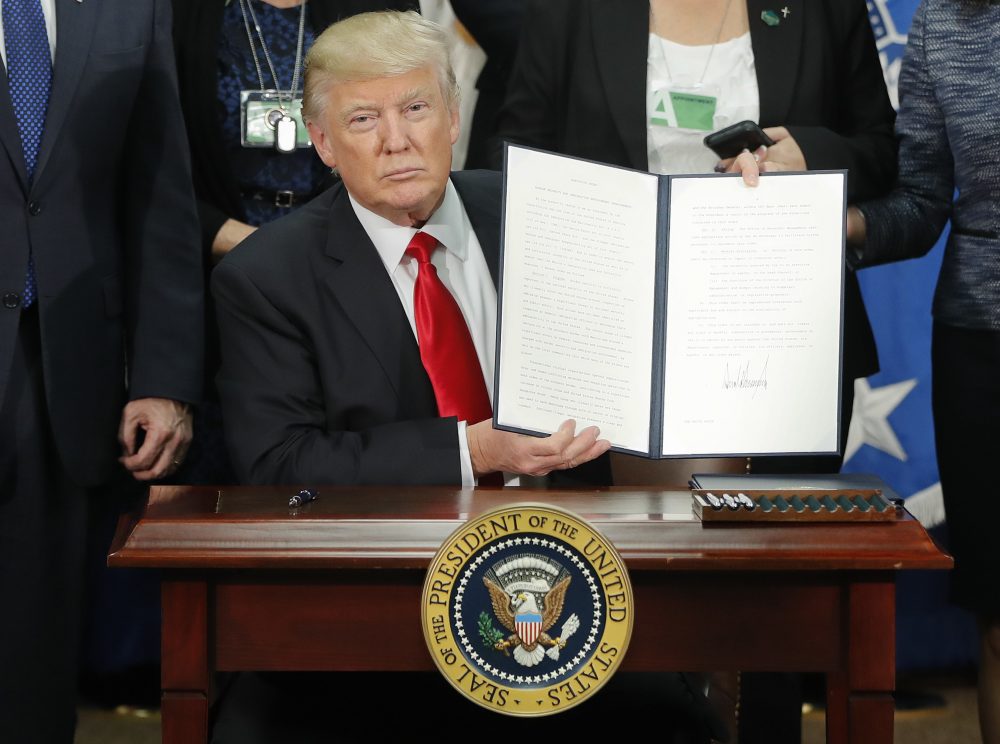Advertisement
Local Tech Companies Say Trump's Immigration Order Is Bad For Business
Resume
As the legal battle over President Trump’s executive order on immigration moves forward in California, more than 100 tech companies — including a few in Massachusetts -- have signed a legal brief opposing the travel ban.
Fuze, TripAdvisor and Brightcove have all signed an amicus brief in the U.S. Court of Appeals for the Ninth Circuit in San Francisco. Trump's executive order banning travel to the U.S. for people from seven predominately Muslim countries has been temporarily suspended.
The Massachusetts companies opposing the travel ban say it's bad for business.
Laurie Harrison, the general counsel of Cambridge-based communications technology company Fuze, said that's particularly true for the tech sector — which often recruits around the world. Fuze has about 700 employees around the world.
"It limits our ability to source the globe for the best tech minds out there to help us drive innovation and drive our company forward as we continue to grow," Harrison said. "We want to do everything possible to stimulate the U.S. economy and bring folks here and be an attractive place to do business for international employees. The order that was passed by President Trump does not support that. So we want to do our part to resist against that."
Some companies opposing the executive order say it's already disrupting their operations. Brad Young, assistant general counsel for Needham-based TripAdvisor, said the company has some local employees from the affected countries who are unsure when they can travel outside the U.S.
"We also have employees from the affected countries [who] work outside of Massachusetts, who are unable to travel back to headquarters for important meetings with their teams and to engage with the business the way we need them to," Young said.
Young said a travel ban also goes against the company's mission.
"As a travel company we’re opposed to any policy or law that curtails travel or stops the free flow of travelers across borders," Young said. He added that TripAdvisor also works with other organizations to resettle and help refugees.
In the legal brief, the companies argue that the U.S. should welcome refugees and immigrants.
The brief also notes that many immigrants have started successful businesses in the U.S. A report by the National Foundation for American Policy, a nonpartisan think tank, found that 51 percent of U.S. startups worth more than $1 billion have at least one immigrant founder. A report by the New American Economy, an organization made up of business leaders, found that more than 40 percent of Fortune 500 companies were founded by immigrants or their children.
David Mendels, the CEO of the video platform Brightcove, is a descendant of refugees who fled Eastern Europe.
"So it's personal issue for me," Mendels said. "I was born in the United States, but my parents weren't, my grandparents weren't."
He said he's concerned about shutting out refugees, and how the order will impact the Boston-based company's international dealings.
"My business is 40 percent outside the United States," Mendels said. "We're an exporter. We generate revenue by selling our goods all over the world. And if we close our doors and put up walls, metaphorical and otherwise, I assume other countries will do the same thing, and that’s a problem for us."
But with all these concerns about the local impact, only three of the more than 100 companies that signed the legal brief are based in Massachusetts.
Some local business leaders say the number of Massachusetts companies may be small because the business community here leans a little more conservative than its West Coast counterpart.
Tom Hopcroft, the president of the Massachusetts Technology Leadership Council, said it's likely more of an issue of geography and the fact that the case is currently moving forward in California.
"I would imagine that had that petition been circulated more broadly on the East Coast you would have seen more companies sign onto that," Hopcroft said. "But that’s fine because we’ll be doing our own brief here so our companies will be well represented and our voices will be heard."
Hopcroft said he's working on filing a similar federal legal brief with several Massachusetts tech companies in the coming days.
Several local tech companies also signed an open letter to Trump Tuesday, calling his executive order "morally and economically misguided." More than 200 companies signed that letter.
The state's biotech community also weighed in on the travel ban. Nearly 100 biotech companies, including more than 50 based in Massachusetts, published a letter Tuesday in the journal Nature Biotechnology slamming the ban.
Correction: An earlier version of this post included the company General Assembly as being based in Boston. Though it has a presence here, it is not based in Boston. We regret the error.
This article was originally published on February 07, 2017.
This segment aired on February 7, 2017.
